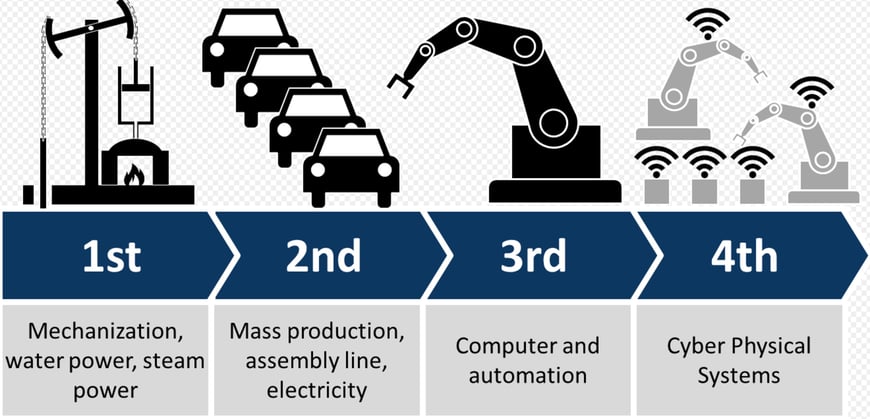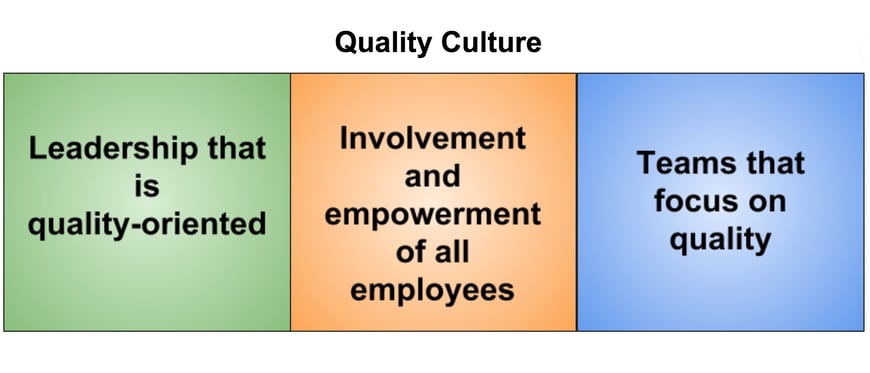The term “Industry 4.0” came to be widely known in 2012 with the suggestion of a modernization blueprint to the German government. Its general idea is nicely captured below:

I read with interest 5 trends for the future of manufacturing, written by Francois Barbier a few weeks ago. He points out some significant trends. However, I am not sure China is ready for the 4th industrial revolution.
Is Industry 4.0 a good fit for Chinese factories?
"Industry 4.0" is a set of concepts that are relevant to manufacturers with relatively sophisticated systems. It can give inspiration to certain German companies when it comes to their improvement roadmap. But, I am not sure many Chinese manufacturers are up to that point yet.
When I think of the average factory that was founded by a Chinese boss, the following images come to my mind:
- Owners who are more interested in negotiating deals with key suppliers, or investing in real estate, than structuring their company
- Production operators that are not aware of the quality and maintenance issues they create
- Months of inventory that slowly collects dust and rusts
- Discrepancies between theoretical (in the database) and real (in the warehouse) stock in the 20%+ range
- Lost fingers, arms, eyes, etc. because of horrendous worker safety
- HR departments that process only hiring, firing, penalties, and pay
- Quality departments that only do end-of-line inspection
- Maintenance staff that focus on fixing what is down
- No system for planning material movements and production
- New products released in mass production without being ready (prototypes are mostly made in a non-reproducible manner)
- Purchasers boasting about the apartments and cars they purchased thanks to bribery
So that's where they are. Does it make sense for them to look at level 4, when they are far from mastering level 2?
A problem with Industry 4.0
The fourth industrial revolution basically makes use of technology and digitizing information. It can look like the dream of a few engineers, far away from the manufacturing floor. It is has everything to do with processes, but and nothing to do with people... Or, to be fair, it assumes that all the work of training and engaging the production staff is already done.
An article published in this month’s Quality Progress (The three pillars of quality manufacturing, by Ben Tomic and Vesna Spasojevic Brkic) illustrates this nicely.
They see the following 3 pillars of a company’s quality culture:
 It’s not all about technology!
It’s not all about technology!
Yes, there are many, many ways technology can help with efficiency, quality, and speed. For example, our COO David Collins drew a list of inexpensive IT tools in Eurobiz, a little over 1 year ago.
However, technology alone is not the solution. It needs to work well with people.
Why the Chinese are very interested in Industry 4.0
It has undeniably caught the interest and the imagination of many manufacturers, as well as that of the government (and Beijing’s Made in China 2025). Some reasons are well known:
- Beijing, as well as most provinces and cities, has distributed large incentives for automation in general. So a 100,000 USD piece of equipment might only actually 'cost' 92,000 USD (that's a very rough estimate).
- China's manufacturing labor productivity is much lower than that of West European and North American countries, and the average level of automation is much lower. It means there is a 'low hanging fruit' opportunity to acquire relatively inexpensive semi-automation to realize substantial productivity gains.
However, in our experience, these cold-headed facts are NOT what guides the decisions of manufacturing managers in China.
Here are the types of thoughts that tend to cross their minds:
- If I buy this piece of equipment, it will impress my friends. (Nice try.)
- If I replace workers, I don't need to manage all their problems and replace them every 8 months. (Giving up on HR management.)
- It's so easy. I open a catalog, pick a few machines, and all of a sudden my customers will feel reassured about quality. (Giving up on understanding how to control processes.)
That’s why I tend to be cynical about ‘smart factories’ and other ‘factories of the future’. When a GE, a Siemens, or an ABB do it, it is probably well realized and helpful. When an average Chinese factory wants to know more about it, I try not have preconceived notions about what will happen, but it’s hard!
What about you? What have been your experiences with bleeding-edge manufacturing technologies in China? What made it succeed (or fail) in your opinion?


!["Will You Save Money With Process Automation in Your Factory" [PPT + sheet]](https://no-cache.hubspot.com/cta/default/2185827/424cd542-b764-4be7-99cc-bdd55738ba04.png)
!["Will You Save Money With Process Automation in Your Factory" [PPT + sheet]](https://no-cache.hubspot.com/cta/default/2185827/52f5b8e3-df93-462a-8296-294ae6cee133.png)

